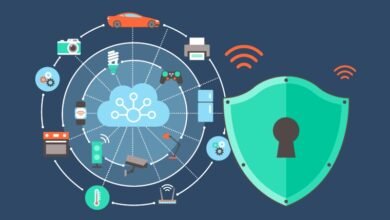How Logistics Companies in Germany Are Using IoT to Stay Competitive
IoT is revolutionizing the logistics sector by enabling real-time tracking, predictive maintenance, automated operations, and data-driven decision-making.

Germany, a global leader in engineering, manufacturing, and logistics, has long been at the forefront of technological innovation. As globalization accelerates and customer demands evolve, the logistics industry is under pressure to become more efficient, transparent, and responsive. To meet these challenges, logistics companies in Germany are increasingly turning to the Internet of Things (IoT). IoT is revolutionizing the logistics sector by enabling real-time tracking, predictive maintenance, automated operations, and data-driven decision-making. This article explores how logistics companies in Germany are leveraging IoT to enhance their competitiveness and streamline operations.
1. Real-Time Tracking and Visibility
One of the most transformative impacts of IoT on logistics is the ability to provide real-time tracking and visibility. German logistics firms are integrating GPS, RFID (radio frequency identification), and IoT-enabled sensors into their transportation and warehousing systems. This technology allows them to monitor shipments, vehicles, and inventory at every stage of the supply chain.
For example, a logistics company in Hamburg can now track a shipment from its departure point in Munich to its arrival in Berlin, including temperature, humidity, and handling conditions. This level of visibility reduces the risk of loss, theft, or damage and enables companies to provide accurate delivery updates to customers. Enhanced transparency builds trust and enhances customer satisfaction, giving German logistics firms a competitive edge.
2. Predictive Maintenance of Fleet and Equipment
IoT sensors play a crucial role in predictive maintenance, a proactive approach to equipment management. Logistics companies in Germany are installing IoT sensors on trucks, trailers, forklifts, and conveyor systems to monitor factors such as engine temperature, oil levels, tire pressure, and vibration.
By analyzing this data, predictive algorithms can identify potential issues before they result in costly breakdowns or downtime. For instance, a logistics firm operating a fleet of delivery vans can schedule maintenance only when necessary, rather than following a fixed schedule. This not only extends the life of the equipment but also reduces maintenance costs and prevents unexpected disruptions.
3. Smart Warehousing Solutions
Warehouses are the backbone of the logistics industry, and smart warehousing is a key area where IoT is making a significant impact. Logistics companies in Germany are implementing IoT technologies such as automated guided vehicles (AGVs), smart shelves, and robotic picking systems.
IoT-enabled smart shelves can monitor stock levels and send automatic alerts when inventory is low, while AGVs can transport goods within the warehouse without human intervention. Robotics, combined with IoT data, enables faster and more accurate order fulfillment. These technologies help reduce labor costs, improve accuracy, and accelerate delivery times, allowing German logistics firms to operate more efficiently.
4. Enhanced Supply Chain Optimization
IoT provides logistics companies in Germany with valuable data that can be used for supply chain optimization. By collecting and analyzing data from various touchpoints—including suppliers, warehouses, transportation, and customers—companies can identify bottlenecks, forecast demand, and make informed decisions.
For example, IoT data can help predict delays due to traffic, weather, or port congestion, allowing companies to reroute shipments and communicate changes to clients promptly. Additionally, logistics firms can use IoT insights to optimize delivery routes, reduce fuel consumption, and minimize carbon emissions, aligning with Germany’s strong focus on environmental sustainability.
5. Cold Chain Monitoring and Management
Cold chain logistics, essential for transporting perishable goods like food and pharmaceuticals, greatly benefits from IoT. Logistics companies in Germany are deploying IoT-enabled temperature and humidity sensors in refrigerated trucks and storage facilities.
These sensors provide real-time data on environmental conditions, ensuring that goods remain within specified parameters throughout the journey. If a deviation occurs, alerts are immediately sent to managers, enabling quick corrective action. This not only helps maintain product quality and safety but also ensures compliance with strict European regulations.
6. Improving Customer Experience
In today’s competitive landscape, customer experience is a key differentiator. IoT helps logistics companies in Germany enhance customer service by providing accurate delivery timelines, proactive notifications, and transparent tracking information.
Clients can access real-time updates via mobile apps or web portals, reducing the need for manual inquiries. Moreover, data collected through IoT devices can be analyzed to understand customer preferences and optimize service delivery. For instance, companies can identify frequently requested delivery windows or preferred pickup points, tailoring services to meet customer expectations.
7. Automation and Robotics Integration
Automation is another area where IoT is playing a pivotal role. Logistics companies in Germany are integrating IoT with robotics to automate repetitive tasks such as sorting, packing, and transporting goods within warehouses and distribution centers.
IoT-enabled robots can communicate with each other and the central management system to perform tasks efficiently and safely. This reduces the need for manual labor, lowers operational costs, and minimizes human error. The result is a more agile and scalable logistics operation that can quickly adapt to market demands.
8. Enhancing Security and Risk Management
Security is a critical concern in logistics. IoT devices help logistics companies in Germany improve security by enabling real-time monitoring and alerts. Smart locks, GPS trackers, and geofencing technologies can be used to monitor vehicle movements and detect unauthorized access or route deviations.
Additionally, IoT data can be used to assess risks and develop contingency plans. For example, if a delivery truck deviates from its designated route or stops unexpectedly, the system can trigger an alert for immediate investigation. This proactive approach to security helps protect assets, ensure regulatory compliance, and reduce insurance premiums.
9. Facilitating Sustainable Practices
Sustainability is a growing priority in the logistics industry, and IoT supports green logistics initiatives. Logistics companies in Germany are using IoT to monitor fuel consumption, emissions, and energy use across their operations.
By analyzing this data, companies can identify areas for improvement, implement energy-saving measures, and reduce their carbon footprint. For example, IoT-enabled route optimization can significantly reduce fuel usage, while smart lighting and HVAC systems in warehouses can lower electricity consumption. These efforts align with Germany’s ambitious climate goals and appeal to environmentally conscious clients.
10. Overcoming Challenges and Ensuring Data Security
Despite the numerous benefits, integrating IoT into logistics also presents challenges. Data privacy and cybersecurity are major concerns, especially when dealing with sensitive customer and operational data. Logistics companies in Germany must invest in robust cybersecurity measures, including encryption, secure data storage, and access control protocols.
Additionally, the integration of IoT systems with legacy infrastructure can be complex. Companies need to adopt scalable platforms and ensure proper training for staff to maximize the benefits of IoT investments. Collaboration with technology providers and adherence to industry standards can help mitigate these challenges.
Conclusion
The logistics sector in Germany is undergoing a digital transformation, with IoT at the heart of this evolution. By embracing IoT technologies, logistics companies in Germany are gaining real-time visibility, improving operational efficiency, enhancing customer satisfaction, and promoting sustainability. As the industry continues to evolve, the adoption of IoT will become increasingly essential for maintaining a competitive edge in both domestic and international markets.
In an era where speed, accuracy, and transparency are paramount, IoT offers the tools logistics companies in Germany need to thrive. Those who invest in this technology today will be best positioned to lead the industry tomorrow.











